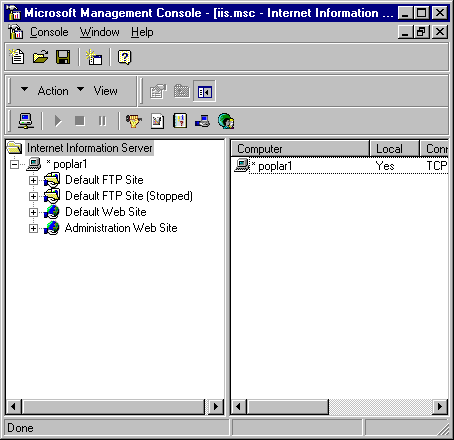
The SEAGULL Web Manager is easy to install and requires very little time or resources.
Insert the BlueZone CD-ROM into the CD drive of the Microsoft web server you wish to install Web Manager. An AutoRun program will launch and you will be presented with a SEAGULL BlueZone Software “Splash” screen.
Click the BlueZone Web-to-Host link.
Click the ASP Web Manager link. This will start the installation process.
The Web Manager "Splash" screen will display for a few seconds followed by the Seagull Web Manager Setup dialog. The Install Seagull Web Manager radio button will automatically be selected. Click the Next button.
The Seagull License Manager License dialog will be displayed. To continue, select the "Yes" radio button and click the Next button.
The Installation Directory dialog will be displayed. We recommend using the default value for the Installation Drive and Directory. You can choose any name you wish for the Virtual Directory. Click the Next button.
The Copy Seagull Activation File dialog will be displayed. If you have a Seagull Activation File, browse to it now. If you do not have an Seagull Activation File at this time, you can manually install it later. Click the Next button.
The Launch Selected Items dialog will be displayed. Select any items that you want to automatically launch immediately after the installation is completed. Click the Finish button.
The Seagull Web Manager files will now be copied to your web server. After the Web Manager installation program is complete, you will receive the following message: “The Seagull Web Manager installation completed successfully”.
Click the OK button to continue.
Any items that you selected in the Launch Selected Items dialog above, will be launched now.
On Windows NT 4.0 Servers, the Web Manager files are by default copied to the following directory:
C:\Inetpub\wwwroot\WebManager
In order for the Web Manager to work properly, it is necessary to name the application path. This is done through the Microsoft Internet Service Manager.
Launch the Microsoft IIS Internet Service Manager Console:
Go to:
Start:Programs:Windows NT 4.0 Option Pack:Microsoft Internet Information
Server:Internet Service Manager.
In the top of the left hand pane find your server name. My server happens to be called “poplar1”. You server name will be different.
Expand the tree next to your server name so you can see your web sites.
Find your web site. There could be more than one. When IIS is first installed, the name automatically assigned is “Default Web Site”. Your Management Console should look something like this:

Expand your web site tree, highlight the SWM directory, right click and select properties. You will see the following screen:
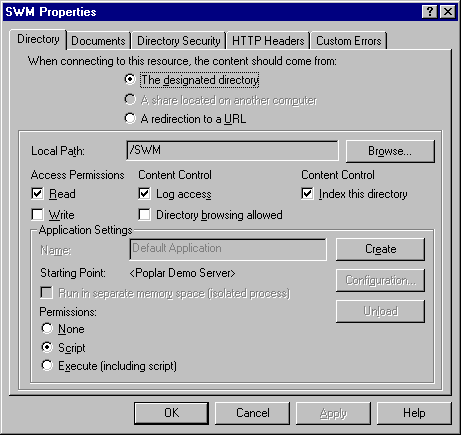
Click the Create button and you will see a box where can enter the name of the application, as shown:
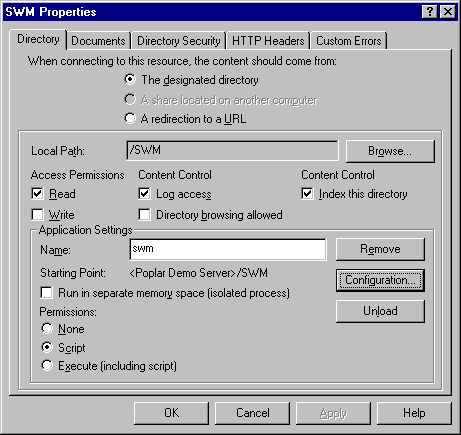
Enter the name the application, swm (as shown above) and click the Apply button.
Click the Documents tab. You should see the following dialog:
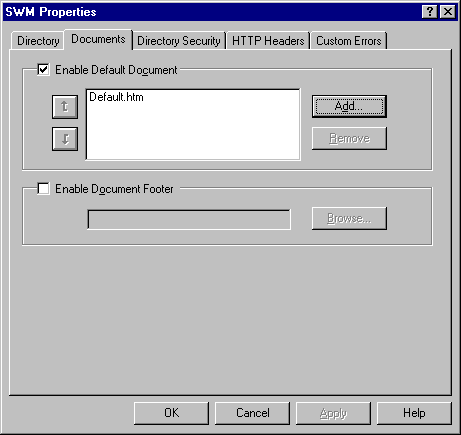
 NOTE Since
BlueZone Web-to-Host is an ASP application, you must tell IIS that the
default page is default.asp and not default.htm.
NOTE Since
BlueZone Web-to-Host is an ASP application, you must tell IIS that the
default page is default.asp and not default.htm.
Click the Add button. You will be presented with the Add Default Document dialog.
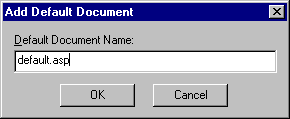
Type in deafult.asp and click the OK button.
Move the default.asp entry to the top of the list by clicking on the up arrow button.
Click OK to save exit this dialog.
 CAUTION! This step is very important. If
you do not perform this step, any end user will be able to download the
entire Web Manager database if they happen to know the correct “path”.
CAUTION! This step is very important. If
you do not perform this step, any end user will be able to download the
entire Web Manager database if they happen to know the correct “path”.
Using the IIS Management Console, go to the SWM folder and expand it by clicking on the plus sign.
Find the folder called "access" and select it. This is where Web Manager stores its database.
Right click and select Properties. The Properties dialog for this folder will display.
De-select the Read checkbox and set the Permissions radio button to None.
Click OK to close the dialog.
The SWM application will have permission to access the data via ODBC, but End Users will not be able to download the database file to their workstations.
Congratulations! The basic installation portion of the Web Manager is complete.